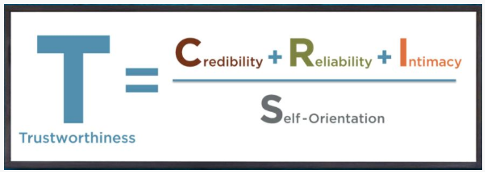An Old Standby for a New Normal
To say there is no shortage of COVID-19-related “best advice” out there is an understatement. Which means one thing that’s in short supply is focus. This post aims to help fill that void as we manage our new normal while also tending to our relationships, both personal and at work.
Enter The Trust Equation—a time- and recession-tested framework for personal trustworthiness (from The Trusted Advisor, by Maister, Green and Galford).

Source: The Trusted Advisor by Maister, Green, and Galford, The Free Press, 2000
Here are a few pandemic-sensitive tips on what to pay attention to, in order of priority.
Self-orientation (S). The biggest trust de-railer for us all right now is also the biggest driver of high self-orientation: fear. When it comes to trust triage in a crisis, this factor deserves the bulk of our attention.
Low self-orientation, which is what we should strive for, equates to a focus on others by (1) putting our attention on them, and (2) making choices that are motivated by their best interests, not ours. Consider it icing on the cake if there’s mutual benefit to be found.
Pandemic-induced fear can trigger our basest instincts: we default to protecting ourselves, obsess about stuff, avoid relationship risks (or any risks, for that matter), and more. Yet true trusted advisorship demands that we find ways to lead from our higher selves instead.
Here’s a starter list of simple strategies for keeping our self-orientation as low as possible:
- Reach out to people—clients and beyond—for one simple reason – to inquire how they are. Period.
- Make generous offers. What’s something concrete that you can give away that would be helpful right now? Think in terms of ideas, resources, even work. Bring value at a time when it’s sorely needed because you can, and because you want to make a difference. No strings attached. No. Strings. Attached.
- Get and stay grounded. If ever there were a time to stay centered, to keep stress levels as low as possible, and to maintain perspective, that time is now. Too many professionals were already wrung out before the you-know-what hit the global fan. Whatever helps you be your best, do it and do it regularly: exercise, meditation, music, dancing, reading, cooking, art, any form of play, a gratitude practice … the possibilities may not be endless right now, but they are numerous.
Things to avoid include anything that might smack of ambulance-chasing from where they sit (even if your intentions are noble), and conversations that focus only on the task at hand. It’s fine, even good, to channel our energy into productive work right now, but not at the expense of leading with genuine caring about the people in our lives.
Intimacy (I). Intimacy equates to safety, and there are many ways to achieve it in relationships. The first two S-lowering strategies above are really two-fers as they not only demonstrate caring, but also increase intimacy by building rapport and connectedness. Here are two additional tools:
- Listen masterfully. Treat every conversation you have right now as an opportunity to hone your empathetic listening skills. It just may be the simplest and most powerful route to building intimacy quickly.
- Let others get to know you. Our current circumstances are a forcing function when it comes to revealing our humanity. Who hasn’t been video-bombed by a small child or a needy pet in the past week? Even journalists broadcasting live from home are making news in unexpected ways. Embrace the opportunities to give others a little insight into your life. You might be surprised at how readily and voluntarily they reciprocate.
Reliability (R). The extent to which your actions are consistent and predictable determines how reliable others deem you to be. I’d normally call this trustworthiness dimension a distant third. Absent a crisis, reliability is table stakes, and generally far too heavily relied upon by services professionals at the expense of other variables. In a pandemic, though, its relative importance increases because of our basic human need for certainty. And while none of us holds the power to answer big questions such as, “When will we be able to go to a live concert again?” we can do things like:
- Make small promises, then routinely follow through. And when plans get derailed, that’s OK, just get in touch immediately to reset expectations.
- Communicate, communicate, communicate.Meetings and touch-points that occur at a regular cadence provide a sense of stability, even if you don’t have new information to share.
Credibility (C). Credibility is fundamentally about words: what you say, and how you say it. Knowing stuff might be helpful to others right now, but unless you’re Tony Fauci it’s not likely to set you apart. Zero in on being honest about your limitations and errorsinstead. For example, be willing to say, “I screwed up in how I handled that,” or “I don’t know”—straightforwardly and with a blend of ego strength and humility.
It’s my first pandemic, and there’s a lot I don’t know right now. One thing I do know is that the trust equation is a simple and profound framework that offers guidance in the best of times and the worst of times.
May we all use it well.





 It raises to the forefront the question: How do you create trust at a distance? Those who figure that out now will be appreciated, effective, and successful going forward.
It raises to the forefront the question: How do you create trust at a distance? Those who figure that out now will be appreciated, effective, and successful going forward.